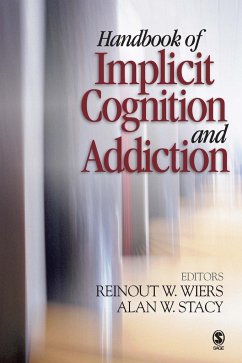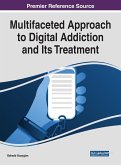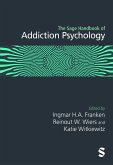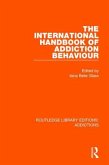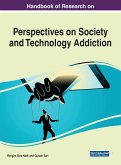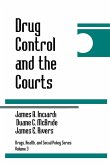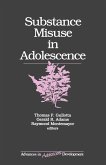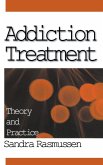- Gebundenes Buch
- Merkliste
- Auf die Merkliste
- Bewerten Bewerten
- Teilen
- Produkt teilen
- Produkterinnerung
- Produkterinnerung
For the first time, research on implicit cognitive processes relevant for the understanding of addictive behaviors and their prevention or treatment is brought together in one volume! The Handbook of Implicit Cognition and Addiction features the work of an internationally renowned group of contributing North American and European authors who draw together developments in basic research on implicit cognition with recent developments in addiction research. Editors Reinout W. Wiers and Alan W. Stacy examine recent findings from a variety of disciplines including basic memory and experimental…mehr
Andere Kunden interessierten sich auch für
![Multifaceted Approach to Digital Addiction and Its Treatment Multifaceted Approach to Digital Addiction and Its Treatment]() Multifaceted Approach to Digital Addiction and Its Treatment235,99 €
Multifaceted Approach to Digital Addiction and Its Treatment235,99 €![The Sage Handbook of Addiction Psychology The Sage Handbook of Addiction Psychology]() The Sage Handbook of Addiction Psychology177,99 €
The Sage Handbook of Addiction Psychology177,99 €![The International Handbook of Addiction Behaviour The International Handbook of Addiction Behaviour]() The International Handbook of Addiction Behaviour62,99 €
The International Handbook of Addiction Behaviour62,99 €![Handbook of Research on Perspectives on Society and Technology Addiction Handbook of Research on Perspectives on Society and Technology Addiction]() Handbook of Research on Perspectives on Society and Technology Addiction282,99 €
Handbook of Research on Perspectives on Society and Technology Addiction282,99 €![Drug Control and the Courts Drug Control and the Courts]() James A. InciardiDrug Control and the Courts100,99 €
James A. InciardiDrug Control and the Courts100,99 €![Substance Misuse in Adolescence Substance Misuse in Adolescence]() Thomas P. GullottaSubstance Misuse in Adolescence100,99 €
Thomas P. GullottaSubstance Misuse in Adolescence100,99 €![Addiction Treatment Addiction Treatment]() Sandra RasmussenAddiction Treatment228,99 €
Sandra RasmussenAddiction Treatment228,99 €-
-
-
For the first time, research on implicit cognitive processes relevant for the understanding of addictive behaviors and their prevention or treatment is brought together in one volume! The Handbook of Implicit Cognition and Addiction features the work of an internationally renowned group of contributing North American and European authors who draw together developments in basic research on implicit cognition with recent developments in addiction research. Editors Reinout W. Wiers and Alan W. Stacy examine recent findings from a variety of disciplines including basic memory and experimental psychology, experimental psychopathology, emotion, and neurosciences.
Hinweis: Dieser Artikel kann nur an eine deutsche Lieferadresse ausgeliefert werden.
Hinweis: Dieser Artikel kann nur an eine deutsche Lieferadresse ausgeliefert werden.
Produktdetails
- Produktdetails
- Verlag: Sage Publications, Inc
- Seitenzahl: 560
- Erscheinungstermin: 1. Dezember 2005
- Englisch
- Abmessung: 260mm x 183mm x 34mm
- Gewicht: 1235g
- ISBN-13: 9781412909747
- ISBN-10: 1412909740
- Artikelnr.: 22302507
- Herstellerkennzeichnung
- Libri GmbH
- Europaallee 1
- 36244 Bad Hersfeld
- gpsr@libri.de
- Verlag: Sage Publications, Inc
- Seitenzahl: 560
- Erscheinungstermin: 1. Dezember 2005
- Englisch
- Abmessung: 260mm x 183mm x 34mm
- Gewicht: 1235g
- ISBN-13: 9781412909747
- ISBN-10: 1412909740
- Artikelnr.: 22302507
- Herstellerkennzeichnung
- Libri GmbH
- Europaallee 1
- 36244 Bad Hersfeld
- gpsr@libri.de
Reinout W. Wiers is Research Associate Professor at Maastricht University, The Netherlands. He received his Masters in Psychonomics (experimental psychology and psychophysiology) at the University of Amsterdam (1992, with honors) and his PhD (1998, with honors) at the University of Amsterdam on cognitive and neuropsychological indicators of enhanced risk for alcoholism. He has published many articles in international journals on addiction research and in cognitive science. Dr. Wiers and colleagues were the first to apply the implicit assocation test to alcohol abuse and are currently focusing on theory, assessment and practical applications of implicit drug-related cognitions, with a grant from the Dutch National Science Foundation (N.W.O. Vidi-grant). He is collaborating with Alan W. Stacy of the University of Southern California in an international project (N.W.O.-Addiction and N.I.D.A.) on implicit cognition and prevention in high-risk youth.
1. Implicit Cognition and Addiction: an Introduction - Reinout W. Wiers &
Alan W. Stacy
Section 1: Definitions, General Theoretical Issues, and Functional
Dual-Process Models
2. What are implicit measures and why are we using them? - Jan de Houwer
3. A dual process approach to behavioral addiction: The case of gambling -
Jonathan St. B. T. Evans & Kenny Coventry
4. Reflective and impulsive determinants of addictive behavior - Roland
Deutsch & Fritz Strack
5. Measuring, Manipulating, and Modeling the Unconscious Influences of
Prior Experience on Memory for Recent Experiences - Cathy L. McEvoy &
Douglas L. Nelson
Section 2: Assessment of implicit cognition in addiction research
6. Word Association Tests of Associative Memory and Implicit Processes:
Prior Experience on Memory for Recent Experiences - Alan W. Stacy, Susan L.
Ames & Jerry L. Grenard
7. Reaction time measures of substance-related associations - Katrijn
Houben, Reinout W. Wiers, Anne Roefs
8. Expectancy as a unifying construct in alcohol-related cognition - Mark
S. Goldman, Richard R. Reich, Jack Darkes
9. Individualized Versus General Measures of Addiction-Related Implicit
Cognitions - Javad S. Fadardi, W. Miles Cox & Eric Klinger
10. Methods, Measures, and Findings of Attentional Bias in Substance Use,
Abuse, - Gillian Bruce & Barry T. Jones
11. Attention to drug-related cues in drug abuse and addiction: component
processes - Matt Field, Karin Mogg & Brendan P. Bradley
Section 3: Brain Mechanisms
12. Addiction and learning in the brain - Henry H. Yin & Barbara J.
Knowlton
13. Imaging the addicted brain: Reward, craving and cognitive processes -
Ingmar H. A. Franken, Corien Zijlstra, Jan Booij & Wim van den Brink
14. Psychophysiology and implicit cognition in drug use: significance and
measurement of motivation for drug use with emphasis on startle tests -
Ronald F. Mucha, Paul Pauli, Peter Weyers
15. Loss of Willpower: Abnormal Neural Mechanisms of Impulse Control and
Decision-Making in Addiction - Antoine Bechara, Xavier Noel, Eveline A.
Crone
16. Implicit and explicit drug motivational processes: A model of boundary
conditions - John J. Curtin, Danielle E. McCarthy, Megan E. Piper & Timothy
B. Baker
Section 4: Emotion, Motivation, Context and Acute Drug effects on Implicit
Cognition
17. Motivational Processes Underlying Implicit Cognition in Addiction - W.
Miles Cox, Javad S. Fadardi & Eric Klinger
18. Emotion and Motive Effects on Drug-Related Cognition - Cheryl D. Birch,
Sherry H. Stewart & Martin Zack
19. Context and Retrieval Effects on Implicit Cognition for Substance use -
Marvin D. Krank & Anne-Marie Wall
20. Acute Effects of Alcohol and Other Drugs on Automatic and Intentional
Control - Mark T. Fillmore & Muriel Vogel-Sprott
Section 5: Implicit Cognitions and different addictions
21. Implicit Cognition and Tobacco Addiction - Andrew J. Waters & Michael
A. Sayette
22. To drink or not to drink: the role of automatic and controlled
cognitive processes in the etiology of alcohol-related problems - Reinout
W. Wiers, Katrijn Houben, Fren T. Y. Smulders, Patricia J. Conrod & Barry
Jones
23. Implicit Cognition and Drugs of Abuse - Susan L. Ames, Ingmar H. A.
Franken & Kate Coronges
24. Implicit Cognition in Problem Gambling - Martin Zack & Constantine X.
Poulos
25. Implicit cognition and cross-addictive behaviors - Brian D. Ostafin &
Tibor P. Palfai
Section 6: Applying Implicit Cognitions to Prevention and Treatment
26. Automatic processes in the self-regulation of addictive behaviors -
Tibor P. Palfai
27. Relevance of Research on Experimental Psychopathology to Substance
Misuse - Peter J. De Jong, Merel Kindt & Anne Roefs
27. Adolescent Changes in Implicit Cognitions and Prevention of Substance
Abuse - Marvin D. Krank & Abby L. Goldstein
29. Implementation Intentions: Can they be used to prevent and treat
addiction? - Andy Prestwich, Mark Conner & Rebecca Lawton
Section 7: Commentaries and General Discussion
30. Towards a Cognitive Theory of Substance Use and Dependence - Kenneth J.
Sher
31. Automatic Processes in addiction: a commentary - Kent C. Berridge &
Terry E. Robinson
32. Addiction: integrating learning perspectives and implicit cognition -
Dirk Hermans & Dinska Van Gucht
33. Being mindful of automaticity in addiction: a clinical perspective - G.
Alan Marlatt & Brian D. Ostafin
34. Common Themes and New Directions in Implicit Cognition and Addiction -
Alan W. Stacy & Reinout W. Wiers
Alan W. Stacy
Section 1: Definitions, General Theoretical Issues, and Functional
Dual-Process Models
2. What are implicit measures and why are we using them? - Jan de Houwer
3. A dual process approach to behavioral addiction: The case of gambling -
Jonathan St. B. T. Evans & Kenny Coventry
4. Reflective and impulsive determinants of addictive behavior - Roland
Deutsch & Fritz Strack
5. Measuring, Manipulating, and Modeling the Unconscious Influences of
Prior Experience on Memory for Recent Experiences - Cathy L. McEvoy &
Douglas L. Nelson
Section 2: Assessment of implicit cognition in addiction research
6. Word Association Tests of Associative Memory and Implicit Processes:
Prior Experience on Memory for Recent Experiences - Alan W. Stacy, Susan L.
Ames & Jerry L. Grenard
7. Reaction time measures of substance-related associations - Katrijn
Houben, Reinout W. Wiers, Anne Roefs
8. Expectancy as a unifying construct in alcohol-related cognition - Mark
S. Goldman, Richard R. Reich, Jack Darkes
9. Individualized Versus General Measures of Addiction-Related Implicit
Cognitions - Javad S. Fadardi, W. Miles Cox & Eric Klinger
10. Methods, Measures, and Findings of Attentional Bias in Substance Use,
Abuse, - Gillian Bruce & Barry T. Jones
11. Attention to drug-related cues in drug abuse and addiction: component
processes - Matt Field, Karin Mogg & Brendan P. Bradley
Section 3: Brain Mechanisms
12. Addiction and learning in the brain - Henry H. Yin & Barbara J.
Knowlton
13. Imaging the addicted brain: Reward, craving and cognitive processes -
Ingmar H. A. Franken, Corien Zijlstra, Jan Booij & Wim van den Brink
14. Psychophysiology and implicit cognition in drug use: significance and
measurement of motivation for drug use with emphasis on startle tests -
Ronald F. Mucha, Paul Pauli, Peter Weyers
15. Loss of Willpower: Abnormal Neural Mechanisms of Impulse Control and
Decision-Making in Addiction - Antoine Bechara, Xavier Noel, Eveline A.
Crone
16. Implicit and explicit drug motivational processes: A model of boundary
conditions - John J. Curtin, Danielle E. McCarthy, Megan E. Piper & Timothy
B. Baker
Section 4: Emotion, Motivation, Context and Acute Drug effects on Implicit
Cognition
17. Motivational Processes Underlying Implicit Cognition in Addiction - W.
Miles Cox, Javad S. Fadardi & Eric Klinger
18. Emotion and Motive Effects on Drug-Related Cognition - Cheryl D. Birch,
Sherry H. Stewart & Martin Zack
19. Context and Retrieval Effects on Implicit Cognition for Substance use -
Marvin D. Krank & Anne-Marie Wall
20. Acute Effects of Alcohol and Other Drugs on Automatic and Intentional
Control - Mark T. Fillmore & Muriel Vogel-Sprott
Section 5: Implicit Cognitions and different addictions
21. Implicit Cognition and Tobacco Addiction - Andrew J. Waters & Michael
A. Sayette
22. To drink or not to drink: the role of automatic and controlled
cognitive processes in the etiology of alcohol-related problems - Reinout
W. Wiers, Katrijn Houben, Fren T. Y. Smulders, Patricia J. Conrod & Barry
Jones
23. Implicit Cognition and Drugs of Abuse - Susan L. Ames, Ingmar H. A.
Franken & Kate Coronges
24. Implicit Cognition in Problem Gambling - Martin Zack & Constantine X.
Poulos
25. Implicit cognition and cross-addictive behaviors - Brian D. Ostafin &
Tibor P. Palfai
Section 6: Applying Implicit Cognitions to Prevention and Treatment
26. Automatic processes in the self-regulation of addictive behaviors -
Tibor P. Palfai
27. Relevance of Research on Experimental Psychopathology to Substance
Misuse - Peter J. De Jong, Merel Kindt & Anne Roefs
27. Adolescent Changes in Implicit Cognitions and Prevention of Substance
Abuse - Marvin D. Krank & Abby L. Goldstein
29. Implementation Intentions: Can they be used to prevent and treat
addiction? - Andy Prestwich, Mark Conner & Rebecca Lawton
Section 7: Commentaries and General Discussion
30. Towards a Cognitive Theory of Substance Use and Dependence - Kenneth J.
Sher
31. Automatic Processes in addiction: a commentary - Kent C. Berridge &
Terry E. Robinson
32. Addiction: integrating learning perspectives and implicit cognition -
Dirk Hermans & Dinska Van Gucht
33. Being mindful of automaticity in addiction: a clinical perspective - G.
Alan Marlatt & Brian D. Ostafin
34. Common Themes and New Directions in Implicit Cognition and Addiction -
Alan W. Stacy & Reinout W. Wiers
1. Implicit Cognition and Addiction: an Introduction - Reinout W. Wiers &
Alan W. Stacy
Section 1: Definitions, General Theoretical Issues, and Functional
Dual-Process Models
2. What are implicit measures and why are we using them? - Jan de Houwer
3. A dual process approach to behavioral addiction: The case of gambling -
Jonathan St. B. T. Evans & Kenny Coventry
4. Reflective and impulsive determinants of addictive behavior - Roland
Deutsch & Fritz Strack
5. Measuring, Manipulating, and Modeling the Unconscious Influences of
Prior Experience on Memory for Recent Experiences - Cathy L. McEvoy &
Douglas L. Nelson
Section 2: Assessment of implicit cognition in addiction research
6. Word Association Tests of Associative Memory and Implicit Processes:
Prior Experience on Memory for Recent Experiences - Alan W. Stacy, Susan L.
Ames & Jerry L. Grenard
7. Reaction time measures of substance-related associations - Katrijn
Houben, Reinout W. Wiers, Anne Roefs
8. Expectancy as a unifying construct in alcohol-related cognition - Mark
S. Goldman, Richard R. Reich, Jack Darkes
9. Individualized Versus General Measures of Addiction-Related Implicit
Cognitions - Javad S. Fadardi, W. Miles Cox & Eric Klinger
10. Methods, Measures, and Findings of Attentional Bias in Substance Use,
Abuse, - Gillian Bruce & Barry T. Jones
11. Attention to drug-related cues in drug abuse and addiction: component
processes - Matt Field, Karin Mogg & Brendan P. Bradley
Section 3: Brain Mechanisms
12. Addiction and learning in the brain - Henry H. Yin & Barbara J.
Knowlton
13. Imaging the addicted brain: Reward, craving and cognitive processes -
Ingmar H. A. Franken, Corien Zijlstra, Jan Booij & Wim van den Brink
14. Psychophysiology and implicit cognition in drug use: significance and
measurement of motivation for drug use with emphasis on startle tests -
Ronald F. Mucha, Paul Pauli, Peter Weyers
15. Loss of Willpower: Abnormal Neural Mechanisms of Impulse Control and
Decision-Making in Addiction - Antoine Bechara, Xavier Noel, Eveline A.
Crone
16. Implicit and explicit drug motivational processes: A model of boundary
conditions - John J. Curtin, Danielle E. McCarthy, Megan E. Piper & Timothy
B. Baker
Section 4: Emotion, Motivation, Context and Acute Drug effects on Implicit
Cognition
17. Motivational Processes Underlying Implicit Cognition in Addiction - W.
Miles Cox, Javad S. Fadardi & Eric Klinger
18. Emotion and Motive Effects on Drug-Related Cognition - Cheryl D. Birch,
Sherry H. Stewart & Martin Zack
19. Context and Retrieval Effects on Implicit Cognition for Substance use -
Marvin D. Krank & Anne-Marie Wall
20. Acute Effects of Alcohol and Other Drugs on Automatic and Intentional
Control - Mark T. Fillmore & Muriel Vogel-Sprott
Section 5: Implicit Cognitions and different addictions
21. Implicit Cognition and Tobacco Addiction - Andrew J. Waters & Michael
A. Sayette
22. To drink or not to drink: the role of automatic and controlled
cognitive processes in the etiology of alcohol-related problems - Reinout
W. Wiers, Katrijn Houben, Fren T. Y. Smulders, Patricia J. Conrod & Barry
Jones
23. Implicit Cognition and Drugs of Abuse - Susan L. Ames, Ingmar H. A.
Franken & Kate Coronges
24. Implicit Cognition in Problem Gambling - Martin Zack & Constantine X.
Poulos
25. Implicit cognition and cross-addictive behaviors - Brian D. Ostafin &
Tibor P. Palfai
Section 6: Applying Implicit Cognitions to Prevention and Treatment
26. Automatic processes in the self-regulation of addictive behaviors -
Tibor P. Palfai
27. Relevance of Research on Experimental Psychopathology to Substance
Misuse - Peter J. De Jong, Merel Kindt & Anne Roefs
27. Adolescent Changes in Implicit Cognitions and Prevention of Substance
Abuse - Marvin D. Krank & Abby L. Goldstein
29. Implementation Intentions: Can they be used to prevent and treat
addiction? - Andy Prestwich, Mark Conner & Rebecca Lawton
Section 7: Commentaries and General Discussion
30. Towards a Cognitive Theory of Substance Use and Dependence - Kenneth J.
Sher
31. Automatic Processes in addiction: a commentary - Kent C. Berridge &
Terry E. Robinson
32. Addiction: integrating learning perspectives and implicit cognition -
Dirk Hermans & Dinska Van Gucht
33. Being mindful of automaticity in addiction: a clinical perspective - G.
Alan Marlatt & Brian D. Ostafin
34. Common Themes and New Directions in Implicit Cognition and Addiction -
Alan W. Stacy & Reinout W. Wiers
Alan W. Stacy
Section 1: Definitions, General Theoretical Issues, and Functional
Dual-Process Models
2. What are implicit measures and why are we using them? - Jan de Houwer
3. A dual process approach to behavioral addiction: The case of gambling -
Jonathan St. B. T. Evans & Kenny Coventry
4. Reflective and impulsive determinants of addictive behavior - Roland
Deutsch & Fritz Strack
5. Measuring, Manipulating, and Modeling the Unconscious Influences of
Prior Experience on Memory for Recent Experiences - Cathy L. McEvoy &
Douglas L. Nelson
Section 2: Assessment of implicit cognition in addiction research
6. Word Association Tests of Associative Memory and Implicit Processes:
Prior Experience on Memory for Recent Experiences - Alan W. Stacy, Susan L.
Ames & Jerry L. Grenard
7. Reaction time measures of substance-related associations - Katrijn
Houben, Reinout W. Wiers, Anne Roefs
8. Expectancy as a unifying construct in alcohol-related cognition - Mark
S. Goldman, Richard R. Reich, Jack Darkes
9. Individualized Versus General Measures of Addiction-Related Implicit
Cognitions - Javad S. Fadardi, W. Miles Cox & Eric Klinger
10. Methods, Measures, and Findings of Attentional Bias in Substance Use,
Abuse, - Gillian Bruce & Barry T. Jones
11. Attention to drug-related cues in drug abuse and addiction: component
processes - Matt Field, Karin Mogg & Brendan P. Bradley
Section 3: Brain Mechanisms
12. Addiction and learning in the brain - Henry H. Yin & Barbara J.
Knowlton
13. Imaging the addicted brain: Reward, craving and cognitive processes -
Ingmar H. A. Franken, Corien Zijlstra, Jan Booij & Wim van den Brink
14. Psychophysiology and implicit cognition in drug use: significance and
measurement of motivation for drug use with emphasis on startle tests -
Ronald F. Mucha, Paul Pauli, Peter Weyers
15. Loss of Willpower: Abnormal Neural Mechanisms of Impulse Control and
Decision-Making in Addiction - Antoine Bechara, Xavier Noel, Eveline A.
Crone
16. Implicit and explicit drug motivational processes: A model of boundary
conditions - John J. Curtin, Danielle E. McCarthy, Megan E. Piper & Timothy
B. Baker
Section 4: Emotion, Motivation, Context and Acute Drug effects on Implicit
Cognition
17. Motivational Processes Underlying Implicit Cognition in Addiction - W.
Miles Cox, Javad S. Fadardi & Eric Klinger
18. Emotion and Motive Effects on Drug-Related Cognition - Cheryl D. Birch,
Sherry H. Stewart & Martin Zack
19. Context and Retrieval Effects on Implicit Cognition for Substance use -
Marvin D. Krank & Anne-Marie Wall
20. Acute Effects of Alcohol and Other Drugs on Automatic and Intentional
Control - Mark T. Fillmore & Muriel Vogel-Sprott
Section 5: Implicit Cognitions and different addictions
21. Implicit Cognition and Tobacco Addiction - Andrew J. Waters & Michael
A. Sayette
22. To drink or not to drink: the role of automatic and controlled
cognitive processes in the etiology of alcohol-related problems - Reinout
W. Wiers, Katrijn Houben, Fren T. Y. Smulders, Patricia J. Conrod & Barry
Jones
23. Implicit Cognition and Drugs of Abuse - Susan L. Ames, Ingmar H. A.
Franken & Kate Coronges
24. Implicit Cognition in Problem Gambling - Martin Zack & Constantine X.
Poulos
25. Implicit cognition and cross-addictive behaviors - Brian D. Ostafin &
Tibor P. Palfai
Section 6: Applying Implicit Cognitions to Prevention and Treatment
26. Automatic processes in the self-regulation of addictive behaviors -
Tibor P. Palfai
27. Relevance of Research on Experimental Psychopathology to Substance
Misuse - Peter J. De Jong, Merel Kindt & Anne Roefs
27. Adolescent Changes in Implicit Cognitions and Prevention of Substance
Abuse - Marvin D. Krank & Abby L. Goldstein
29. Implementation Intentions: Can they be used to prevent and treat
addiction? - Andy Prestwich, Mark Conner & Rebecca Lawton
Section 7: Commentaries and General Discussion
30. Towards a Cognitive Theory of Substance Use and Dependence - Kenneth J.
Sher
31. Automatic Processes in addiction: a commentary - Kent C. Berridge &
Terry E. Robinson
32. Addiction: integrating learning perspectives and implicit cognition -
Dirk Hermans & Dinska Van Gucht
33. Being mindful of automaticity in addiction: a clinical perspective - G.
Alan Marlatt & Brian D. Ostafin
34. Common Themes and New Directions in Implicit Cognition and Addiction -
Alan W. Stacy & Reinout W. Wiers

